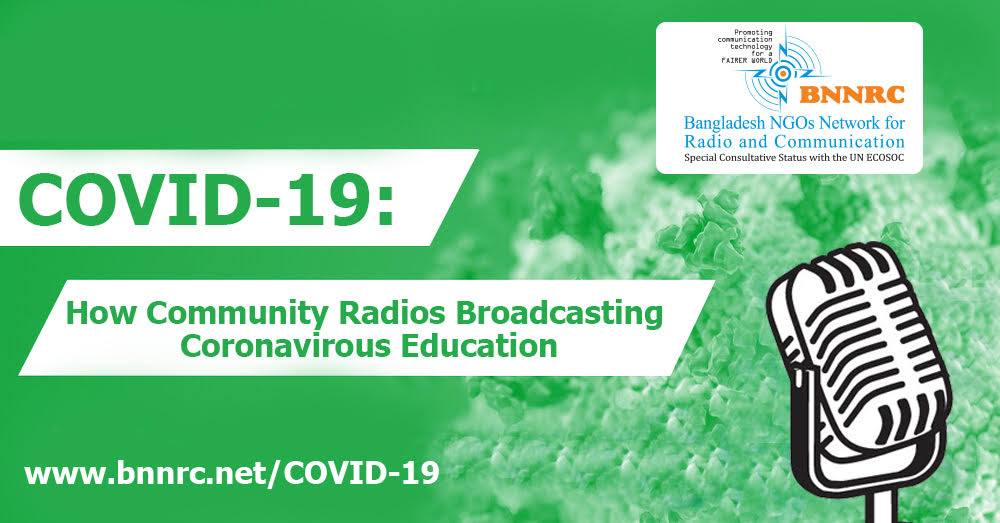AHM Bazlur Rahman
Bangladesh NGOs Network for Radio and Communication (BNNRC) has been mobilizing all community radios for developing and broadcasting awareness-building programs on COVID-19: Coronavirus contamination to protect lives and livelihoods since March 1, 2020. www.bnnrc.netNow 18 Community Radios stations in Bangladesh have been broadcasting 165 hours Coronavirus prevention education in line with the National Preparedness and Response Plan for COVID – 19, published by Directorate General of Health Services, Health Service Division, Ministry of Health and Family Welfare, Government of the People’s Republic of Bangladesh.
The Community Radio stations are Community Radio Padma 99.2 FM, Radio Nalta 99.2 FM, Loko Betar 99.2FM, Radio Pollikontho 99.2 FM, Radio Sagor Giri, 99.2 FM, Radio Mahananda 98.8 FM, Radio Mukti 99.2 FM, Radio Chilmari 99.2FM, Radio Jhenuk 99.2 FM, Krishi Radio 99.8 FM, Radio Naf 99.2 FM, Radio Bikrampur 99.2 FM, Radio Meghna 99.0 FM, Radio Sagor Dwip 99.2FM, Radio Sarabela 98.8 FM, Radio Boral 99.0FM,
Contribution: The COVID -19 demands cooperation among government, CSOs, local business communities, multi-stakeholders. BNNRC are continuing work 24×7 to reach rural communities in Bangladesh with life-changing information through the community radio. It’s not easy to get information to the hard-to-reach at the best of times, and we will continue to strive to make sure the needs of these communities are not forgotten. To that note, we’ll be continuing to share stories of our work, and the work of community broadcasters and rural people, while also supporting communities in getting the information they need about COVID-19.
In this perspective, BNNRC has been working on COVID -19 covering with the following issues:
1. Animate CSOs, Government, health service providers and communities for reinforcing collective action.
2. Keeping community people’s daily life normal and livelihood function
3. Mobilize further cooperation among government, CSOs, local market and communities’ response
To this end, we are: Actively distributing information and resources, including scripts and backgrounders, about how to plan and produce effective COVID-19 radio programming;
Creating or activating spaces, such as social media groups, to give radio broadcasters a place to learn from each other about best practices in COVID-19 community radio programming; Developing connections between broadcasters and health authorities in government, and civil society to ensure accurate information goes out and myths are debunked; Reminding community broadcasters of the steps they can take to stay healthy; Commending community broadcasters and other journalists for being on the front line and continuing to work in these conditions
Key findings: Community Radios stations, as one of the source of information, helping to raise awareness on COVID- 19 and reinforcing Behavior Change Communication (BCC) by CSOs, Government, health officials and locally elected bodies (LEB).

Community Radio stations are building awareness to change attitudes among community people at different points in their daily lives. Community Radio stations, as a platform for those who involve in COVID -19 responses to update rural communities. They are also providing a channel for two-way communication with community people where listeners are sending SMS or call in with questions.
Community Radio stations have been coordinating with the District and Upazila level Coronavirus Prevention Committees. Community Radio stations have assigned one broadcaster in each radio stations as the focal person to coordinate COVID – 19 program.
Community Radio stations are broadcasting programs on COVID -19 in local languages or dialects. Community Radio stations are producing contents which speaks directly to localized issues and concerns, and features trusted local people in a way that nationally or regionally produced content cannot.
Implications: It is really working and having a very positive effect at the rural communities. Community Radio stations help to reduce the panic of COVID – 19 gradually by broadcasting awareness programs. Now the community people are taking precautionary measures to prevent contamination of COVID – 19. People now understand more about the COVID – 19. Community Radio stations have already been established a well-trusted source of information for rural people of Bangladesh.
We know community radio programming is an important tool in flattening the curve, tamping down panic in line with misinformation, disinformation, and extending advice and comfort to the people most affected —wherever they live.
BNNRC has formed a monitoring team consists of 5 members. The team is monitoring the situation and providing necessary support to Community Radio stations. Mark Manash Saha acts as the Program Coordinator of the BNNRC COVID-19 monitoring cell.




